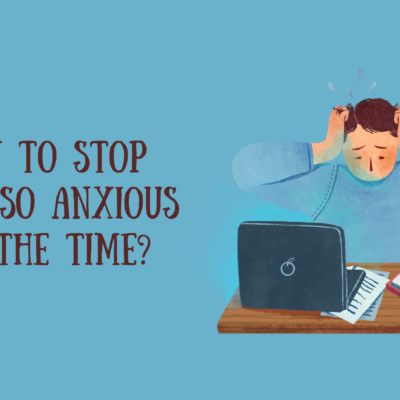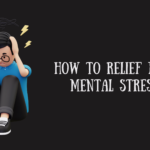How to Stop Being so Anxious all the Time: Anxiety is a natural response to stress, uncertainty, or fear. In small amounts, it can be useful, helping us stay alert and prepared. However, when anxiety becomes constant and overwhelming, it can interfere with daily life, affecting mental and physical health. If you often feel anxious for no apparent reason or find it hard to relax, it’s important to learn how to manage and reduce this feeling.
In this guide, we will explore practical strategies to stop feeling anxious all the time and regain a sense of calm and control over life.
Also Read:
- How to Stop Overthinking Situations?
- Ways to Destress Your Life.
- Overcoming Social Anxiety and Shyness: Steps to Confidence and a Fulfilled Life.
Understanding Anxiety
Before we dive into the solutions, it’s essential to understand what anxiety is and why it happens.
What is Anxiety?
Anxiety is a feeling of worry, fear, or unease about something uncertain or unfamiliar. It is linked to the body’s fight-or-flight response, which is designed to protect us from danger. However, in people with chronic anxiety, this response can be triggered even when no real threat exists.
Common Causes of Anxiety
- Overthinking and Worrying – Constantly thinking about negative outcomes.
- Stressful Situations – Work pressure, financial problems, or relationship issues.
- Health Concerns – Fear of illness or past medical experiences.
- Social Pressure – Fear of judgment or criticism from others.
- Lack of Sleep and Poor Lifestyle Habits – Unhealthy routines that increase stress levels.
Symptoms of Anxiety
- Racing thoughts and excessive worry
- Restlessness and feeling on edge
- Rapid heartbeat and shortness of breath
- Muscle tension and headaches
- Trouble sleeping or concentrating
Now, let’s look at how to calm anxiety and regain peace of mind.
How to Stop Being so Anxious all the Time?
1. Practice Deep Breathing Techniques
Breathing exercises help slow down your nervous system, reducing the physical symptoms of anxiety.
How to Do Deep Breathing
- Sit in a comfortable position and close your eyes.
- Inhale deeply through your nose for 4 seconds.
- Hold your breath for 4 seconds.
- Exhale slowly through your mouth for 6 seconds.
- Repeat this process for 5–10 minutes whenever you feel anxious.
Deep breathing increases oxygen flow to the brain, calming the mind and body.
2. Challenge Negative Thoughts
Anxiety is often fueled by negative thinking patterns. The key to reducing anxiety is to identify and challenge these thoughts.
How to Overcome Negative Thinking
- Recognize the Thought: When you feel anxious, ask yourself, “What am I afraid of?”
- Question It: Is this fear realistic, or is my mind exaggerating the situation?
- Replace It: Instead of saying, “I will fail,” reframe it as, “I will do my best, and that is enough.”
Practicing positive self-talk can help retrain your brain to be less anxious over time.
3. Practice Mindfulness and Meditation
Mindfulness means focusing on the present moment rather than worrying about the past or future.
How to Practice Mindfulness
- Sit quietly and pay attention to your breathing.
- Notice your thoughts without judging them.
- Focus on your senses (What do you see, hear, or feel?).
- If your mind starts to wander, gently bring it back to the present.
Meditation apps like Headspace or Calm can help you get started.
4. Limit Caffeine and Sugar Intake
What you eat and drink can affect anxiety levels.
Foods That Worsen Anxiety
- Caffeine (Coffee, Energy Drinks) – Increases heart rate and nervousness.
- Refined Sugar (Sweets, Soda) – Causes energy crashes that worsen anxiety.
- Alcohol and Processed Foods – Can disrupt sleep and mood stability.
Foods That Help Reduce Anxiety
- Chamomile Tea and Herbal Teas – Naturally calming.
- Dark Chocolate – Boosts mood-enhancing serotonin.
- Leafy Greens and Nuts – Contain magnesium, which helps relax the nervous system.
Making healthier food choices can have a huge impact on reducing anxiety levels.
5. Engage in Regular Physical Activity
Exercise is a natural stress reliever. It helps release endorphins, the body’s “feel-good” hormones.
Best Exercises to Reduce Anxiety
- Walking or Jogging – Clears the mind and reduces stress.
- Yoga and Stretching – Combines movement with deep breathing.
- Strength Training – Builds confidence and reduces tension.
- Dancing – A fun way to boost mood.
Just 30 minutes of exercise per day can significantly reduce anxiety.
6. Establish a Healthy Sleep Routine
Poor sleep increases stress and anxiety.
Tips for Better Sleep
- Set a Fixed Sleep Schedule – Sleep and wake up at the same time daily.
- Avoid Screens Before Bed – Reduce exposure to blue light.
- Create a Relaxing Routine – Read, stretch, or listen to soothing music.
- Limit Caffeine in the Evening – Avoid coffee at least 6 hours before bedtime.
A well-rested mind is better equipped to handle stress and anxiety.
7. Avoid Overstimulation from Social Media
Constant exposure to negative news, online arguments, and unrealistic standards on social media can worsen anxiety.
How to Reduce Social Media Anxiety
- Set daily screen time limits.
- Unfollow pages that make you feel anxious.
- Take social media breaks (especially before bed).
- Focus on real-life activities rather than scrolling endlessly.
A digital detox can help clear mental clutter and reduce anxiety.
8. Talk to Someone You Trust
Keeping anxiety bottled up can make it worse. Sharing your feelings with a friend, family member, or therapist can help release emotional tension.
How Talking Helps
- Provides emotional support and reassurance.
- Helps you gain new perspectives on problems.
- Strengthens social connections, reducing loneliness.
If anxiety is severely affecting daily life, seeking professional therapy can be highly beneficial.
9. Engage in Relaxing Activities
Doing activities that you enjoy and find relaxing can shift your focus away from anxiety.
Examples of Relaxing Activities
- Listening to Music – Soothing music can calm the mind.
- Reading Books – Helps escape anxious thoughts.
- Painting, Drawing, or Writing – Expressing emotions creatively can be therapeutic.
- Gardening or Spending Time in Nature – Being outdoors reduces stress.
Prioritizing relaxation helps restore mental balance and inner peace.
10. Accept That You Cannot Control Everything
A big part of anxiety comes from worrying about things we cannot control. Learning to let go can be life-changing.
How to Stop Worrying About the Uncontrollable
- Focus on what you CAN control (your actions, thoughts, and attitude).
- Practice gratitude – Shift your focus from worries to what you’re thankful for.
- Remind yourself that perfection is not required – Mistakes and uncertainties are part of life.
Accepting uncertainty can help free the mind from excessive worry.
Final Thoughts
Anxiety is a common experience, but it does not have to control your life. By practicing deep breathing, mindfulness, exercise, healthy sleep habits, and positive thinking, you can significantly reduce daily anxiety.
The journey to a calmer mind takes time, so be patient and kind to yourself. Implementing even a few of these techniques can bring lasting peace and emotional stability.








